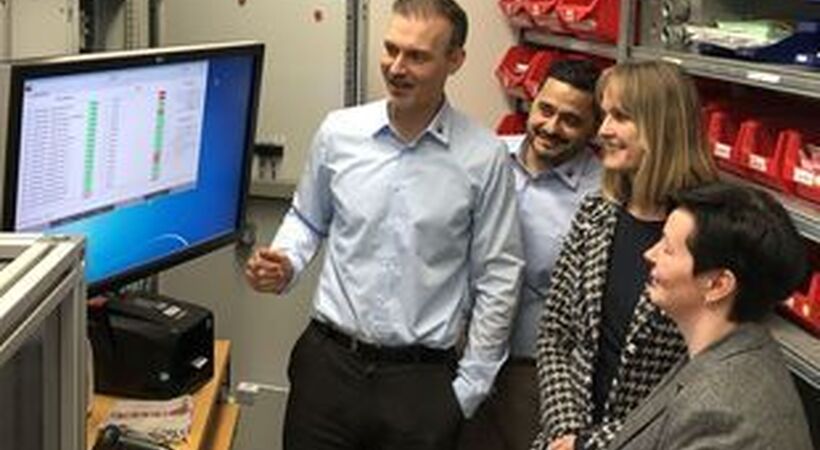Digitalisation in production is continuing unabated, with monitors, sensors, cameras and server farms becoming characteristics of modern production halls.
Suitable solutions are available from the start of the production chain, all the way up to the cold end.
EME GmbH uses a virtual factory solution. With a distributed control system from Siemens, the company creates a digital twin of a plant prior to its commissioning.
Using software simulations and real-time analyses, they are able to discover errors in advance and minimise potential hazards. Operators can simulate emergency scenarios which would not be possible during ongoing operations, as the simulation software is separate from the actual plant software.
Once a plant is operational, all data is collected, archived and evaluated, while remote access to the customer ensures quick reactions in the event of a fault.
The goal is to establish standardised interfaces to enable all devices to communicate with each other, for example using OPC UA. Here, the hardware used is not a relevant factor, as the concept is server-based.
EME has converted its entire batch system to use web technology, and the company sees its future as being online. Only the browsers require testing, after which the operator can use any end device.
The operator can link ERP and other manufacturing execution systems with the field level and SCADA, which are isolated solutions protected by a firewall.
No autoclave required
Digitalising processes is sensible if the company can benefit from data analysis. Ideally, the management should not only derive immediate measures, but also gain insights for the future.
At the moment, the overall assessment of a production plant is often overlooked.
Instead, individual line segments are often digitalised, and as a result data is only collected at certain points.
UAS Messtechnik uses its developments and future research projects to improve energy management and optimise costs throughout the entire production line.
Additional measurement data is included in the assessments, as well as raw material prices and the quality data of the produced articles.
Depending on their requirements, the manufacturer can link modular systems to the existing systems in order to depict the production as a holistic unit and optimise it as such.
If the plant is operated using fossil fuels and electric auxiliary heating, coupled controls may result in energy and cost savings, depending on the use. These processes must be monitored.
Deviations that only emerge gradually are difficult to identify. However, using data, algorithms and physical regularities, these deviations can be discovered over time.
For example, ever stronger corrective actions for the same setpoint and similar framework conditions are an indication that thermocouples are ageing.
At the same time, if the actual value of the glass temperature changes while the setpoint and the regulator output on the burners remain constant, this can indicate influences from other parameters, such as changed settings of the electric auxiliary heating.
UAS is planning a modular system with individual tools that work independently of one another.
It has been created as a research project in cooperation with multiple interdisciplinary companies and the Grafenau Technology Campus at the Deggendorf Institute of Technology.
Smart to the last valve
Working with pressure requires valves. If a valve is faulty, it is replaced. Or at least this used to be the case. Digitalisation does not stop at pressure-regulating valves.
Ross Europa has therefore concentrated on adapting its proportioning valves to work in a smart environment with its software developed in-house.
The software helps determine whether a valve is actually responsible for faults in the production process, with smart functions organised into self-diagnosis, system diagnosis and communication clusters.
A three-stage communication process can notify the user of faults, monitor processes or analyse. Up to 254 valves can be actuated via an RS-485 bus line and a diagnostics tablet.
The system can recognise influencing variables, such as fluctuations in voltage and pressure, incorrect offsets and much more. Up to 14 states can be displayed by an LED on the valve, while a circular buffer provides initial information.
Details of the process and settings data can be shown by conducting a more in-depth analysis of the data and online measurements on the diagnostics tablet using special software.
The monitoring limits and functions are stored in the valve, as are the parameters. After 50 or 65 million control cycles, the system sends signals for predictive maintenance or replacement. All smart functions are optional, and the electrical standard interface remains unchanged. Moreover, the valves are robust against dirt – an advantage in container glass production.
Perfectly tracked
Other tasks await at the cold end in container glass production: the auditing requirements of food and beverage filling companies are increasing.
From the time of inspection, the state of each individual article must be traceable without any interruptions. MSK Verpackungs-Systeme has specialised precisely in this area in the intralogistics sector.
The company’s visualisation software communicates with ERP systems and peripheral devices, enabling processes to be controlled in a uniform and connected manner.
The software boasts intuitive touch operation and has interfaces to all well-known PLCs and operating systems.
Automation makes it much easier to switch between jobs. The system automatically collects all the important data on production, downtime, maintenance and fault times and evaluates it.
An integrated calendar function enables predictive management of job changes and maintenance.
The software displays error causes and offers solutions, also via remote maintenance.
The EMSY analytics data management software combines the data from all devices in real time. Increasing digitalisation makes it possible to develop self-learning systems which boost efficiency and can help compensate for the increasing lack of available specialists.
From the summer of 2020, MSK will also offer EMSY smart, which enables the mobile monitoring of MSK system statuses.
Virtual reality solutions are planned for 2021.
Important links:





